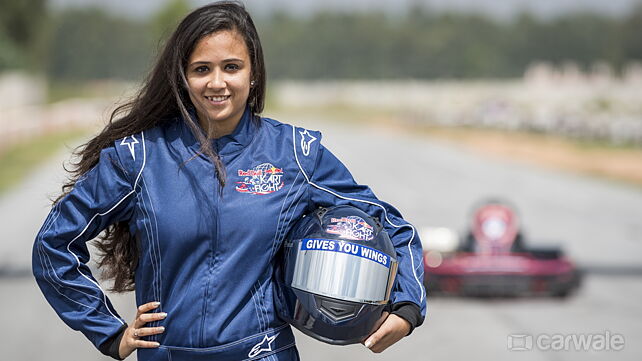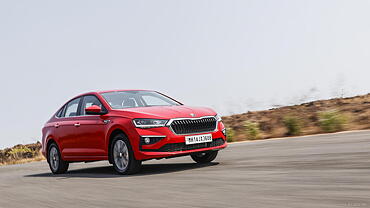
When 18-year-old formula racer Mira Erda was first introduced to a karting track at the age of eight by her father, other people had plenty to say about it. “Why are you letting a girl drive?” was a question often posed to her father, Kirit Erda, a businessman in Vadodara. But Kirit, an ardent enthusiast of motorsports had just then started a private karting track in Vadodara and had no intention of keeping either of his children away from it. “My brother and I literally grew up on the race track. And I had so much fun there that it was only natural that I would want to take up racing,” said Mira.
Her entry into racing only brought more questions and advice from ‘well-meaning’ relatives and friends. “People often told my dad that he was wasting his money by investing it in my racing career and that, as a girl, I was anyway going to leave him someday,” recalled Mira. “But my dad fought for me. He pointed out to all these people that I was a human being with desires and dreams. If I wanted to excel in this field, then he was going to do everything he could to help me achieve it.”
But it wasn´t just people in their social circles who had an issue with Mira´s entry into racing. The eight year-old got a glimpse into the gender divide fairly early in her life at the race track. “During my initial days of racing in 2010, the guys at the track and even some teams found it hard to accept the idea of a girl racing,” she recounted.
Barely 25 days after training, she competed in the 2010 J K Tyre Rotax Max Championship in the Micro Max category (for children under 12 years of age). “That was in Hyderabad and I was a nervous-wreck as it was my first race and I had no idea how it would be. The race began and I was driving with all boys and some of them tried to force me off the track. But I had a fun streak in me too and wasn´t about to give up so easily. I stuck at it and finished the race.”
By the time she started making podium finishes a year later at the age of 11 and won the title of Best Improved Player for the Year, some of the resistance to her presence on the track had toned down and she had become a young player to be reckoned with.
From then on, Mira continued to grow in her racing career. In 2014, she started training for formula 4 racing. She took part in JK Racing Championship 2014 as the youngest formula 4 female driver in India. In 2016, she was crowned the Formula 4 Rookie Champion of the Year and honoured by the FMSCI, the governing body for motorsports in India with the ´Óutstanding Woman in Motorsports´ award.
Furthermore, in 2017, she became the first Indian woman to race in the Euro JK Series, one of the highest classes of formula racing in India.

“Looking back, I´d say that had I been born in another family, it would have been impossible for me to achieve what I did,” said Mira. “My parents were so supportive and committed to my career choice! My dad helped me out with all my racing related issues, my mom helped me with studies. And my brother, who also loves racing, gave it up as a career choice to help me out because he felt I was better at it. I know that many other female racers, who were not so fortunate in this aspect, have really struggled.”
But the situation has improved quite a bit today, feels Mira. “Last year, in keeping with my association with Red Bull, I was a part of the Red Bull Catch Up, a go-karting tournament for amateur female racers and I was amazed at the enthusiasm and the turnout for the event. We still have a long way to go, of course. India isn´t known for motorsports and the female racers abroad have a much better support, training and infrastructure system. As a result, they are more experienced and have better handling of their machines.”
“But things are changing here too,” she added. “I am expecting even better turnout at the Red Bull Catch Up this year. I see the shift in attitudes even among male racers and I am getting better support too, overall. In fact, when I entered formula racing, many of the male racers were boys I had grown up with on the race track, whom I had raced against so many times. So I didn´t face any of the prejudice then that I had faced when I first started karting.”
The next thing to do, feels Mira, is to hold more amateur racing events and school level programs to cultivate interest at an early age, particularly to improve female participation. The burden for this, falls to a fair extent, on the government. “Right now, most amateur events are held by private companies and brands. The FMSCI too has been pretty helpful, in my opinion. It doesn´t differentiate. All it sees is whether you have got the passion it takes to make it. In fact, it´s amazing that an Indian governing body is so enthusiastic. There have been many instances when I traveled abroad for competitions and FMSCI procured all my necessary licenses in record time. However, the government has been slow to provide infrastructure and financial support for motorsports in India, in general. And we haven´t got any female international racers in India.”

It´s a tough task ahead, but the 18-year-old racer intends to keep fighting the good fight against gender stereotypes. “Hopefully, in a few years´ time, we will not have to keep fighting these prejudices in order to achieve a career in motorsports,” said Mira.
For now, she plans to focus on the Asian F3 this year and chalk up a few more national championships to her record and get more experience. “For there is still a lot of learning to be done and then maybe, the European F3 next year,” she added before signing off.
































